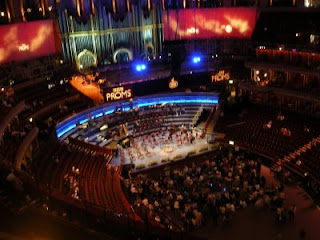Prom 10, 2009 - French & Japanese Fare

The Orchestre National de Lyon came to the Proms with their chief conductor Jun Märkl with a meaty programme of eight pieces of familiar French and relatively unfamiliar Japanese repertoire. It was not a full house, which was sad because if nothing else the programme offered two excellent soloists and a chance to hear one of the better French provincial orchestras.
Our journey started with Takemitsu's piece for orchestra and soloist, Ceremonial: An Autumn Ode. The shō is a kind of mouth organ. It was played by the barefoot Mayumi Miyata who is one of the finest exponents of this ancient and unfamiliar instrument. Its a slow moving piece which like much of this composers music exists in a kind of pulsing sensual series of moments in time - not unlike Debussy at his most ethereal. Its the second time I have heard the piece at the Proms and it is very atmospheric in this Hall. The soloists stands in glorious isolation - last night she was spot-lit: an almost ghostly figure. JM marshalls his forces well and they were considerable forces too. This performance was sharper and more finely judged than the performance I'd heard the NHK Symphony Orchestra give ten or so years ago
A Debussy piano piece, Estampes - Pagoda, followed in an orchestrated version which was nice enough but so obviously "not by Debussy". Final in this first third of the programme we had Ravel's Rhapsodie Espagnol for which the forces further. The tendency of conductors to miss the orchestral colour of this piece by tending too carefully to the strings wasn't on display but there was something rather forensic about JM's approach. In the end it didn't so much burst forth as apply an excitement factor of 83.2% to overly calibrated playing.
An interval was followed by Takemitsu's Green, 1967, a short piece of natural pictorialism which was new to me in fact but quite reminiscent of the work of Messiaen seen through Takemitsu's "East reflects West reflects East" prism.
Two violin showcase pieces followed - each tacked to the programme's theme's of French music - the first, Saraste's Carmen Fantasy and the second Ravel's Tzigane. There was artistry and dazzling technical ability in the delivery of both. The beautiful Akiko Suwanai played an equally beautiful Strad which was once played by Heifitz with lots of care and control but I didn't feel a fire burning.
The final part of the mamooth programme was made up of two pieces both showing the highest quality of composition. A new piece by Japanese composer, Toshio Hosokawa called Cloud and Light called for the return of the shō and the statuesque Miyata. This is a haunting piece of atmospheric writing - in the same dreamlike genre as Debussy's Nuages but utterly individual. I have heard that British composer Steve Martland was somewhat dismissive of it, which I think is ill-judged. The combination of East and West in the orchestration is perhaps seen as some on both sides as an natural hybrid, but the rest of our programme tonight showed how interests in other musical cultures can inform and colour our indigenous Western expression. It bears a second listen and probably a third. The soloist is more taxed by this piece and her playing held the audience spellbound.
Debussy's La Mer calls for a big orchestra and for this performance the orchestra was expanded especially in the strings, where there were, fro example 10 double basses. And it should be recorded that this orchestra still has the hall marks of the traditional French orchestra in the winds and brass - oboes and horns showing a distantly different ancestry. JM conducted without a score and with a level of suave choreography that put one in mind of Tilson Thomas or Muti - with his huge sweeping baton movements. There was some fantastic attention to detail - watching him conduct the horns in that tricky passage in the first movement where dynamics are usually forgotten, JM conducted his players to realise a beautiful melodic interlude.
All of that said the orchestra, whilst smiling at the audience, didn't smile much at each other and the result was palpable - a disengaged orchestra played extremely well, with delicacy and vigour when required, but they were I think overly marshaled and it came over that way.


Comments